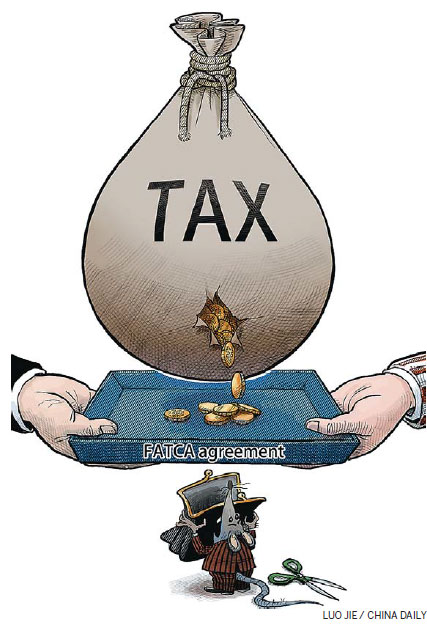Tax deal heralds better China-US ties


Optimism reigns with the prospect of further cooperation between the two biggest economic powers
The recent agreement between the United States and China to implement a new US law aimed at penalizing overseas Americans for evading tax should be welcomed, because it will generate many economic benefits. The agreement will also enable Beijing to get information on Chinese taxpayers in the US and help it bring tax evaders to justice.
Long seen as a crucial step for the rollout of the 2010 Foreign Account Tax Compliance Act, the agreement with China in substance was concluded just days before the law took effect on July 1. The US now has FATCA agreements with more than 80 economies. These agreements require foreign banks, investment funds and other financial institutions to inform the US government about Americans who have more than $50,000 in their accounts.
Crucially, foreign companies that do not comply with the law face a 30 percent withholding tax on incomes from their investments in the US and they could in effect be frozen out of US capital markets. The law came into being after many Americans were found evading tax by having secret bank accounts in Switzerland.
The China-US IGA, however, has implications that transcend the fields of international finance and economics. For one, it marks another positive development in Sino-US political relations.
Also, the IGA comes on the heels of Premier Li Keqiang's visit to the United Kingdom and Greece, during which trade deals worth about $30 billion were signed. It can thus be seen as another significant example of improving relations between China and the rest of the world.

Specifically, relations between the Chinese and US governments have not progressed smoothly in recent years, with both sides accusing each other of industrial espionage. Hopefully, the IGA will pave the way for more cooperative, mutually beneficial, inter-governmental dealings.
But that is possible only if the US government wakes up to the realization that engagement with China is the way forward and that business and trade deals with it will prosper only if inter-governmental relations are satisfactory, if not excellent.
China's investment in and trade with Europe are examples of the economic implications of sound inter-governmental relations. The US government should learn from Sino-European governmental relations and use the IGA to build a more tangible and ever-engaging political relationship with China. But for that to happen, the US has to accept that it is no longer the world's sole economic superpower and eschew any resulting fears and anxieties. Besides, it needs to view China's economic rise positively and consider it a major economic opportunity, instead of seeing it as a threat.
China too has an important role to play in developing governmental relations with the US. For instance, the Chinese authorities have to display maximum transparency and effectiveness in implementing the Sino-US deal. Both sides need to demonstrate effective implementation and take strict and decisive action as soon as any examples of non-compliance become evident. Any gap between policy and implementation could hurt Sino-US governmental relations with the bandying of accusations between the two sides.
Overall, however, optimism reigns with the prospect of further engagement and cooperation between the two biggest economic powers. A key reason for the optimism is the modern, progressive nature of the current Chinese political administration.
Li's visit to the UK and Greece has been hailed as a massive success on the trade and economic fronts.
By making similar efforts to improve political relations with the US, China has made the IGA a reality, and this approach could lead to more such agreements and strengthening of the Sino-US symbiotic relationship.
The author is a visiting professor at the University of International Business and Economics in Beijing and a senior lecturer in marketing at Southampton Solent University's School of Business. The views do not necessarily reflect those of China Daily.
(China Daily Africa Weekly 07/04/2014 page12)
Today's Top News
- Trump threatens 10% tariffs on 8 NATO allies
- PLA monitors US naval vessels transiting the Taiwan Strait
- The high cost of US cutting vaccine funding
- Visit highlights China's importance
- China fortifies energy security as risks rise
- Taiwan separatists warned of action






























